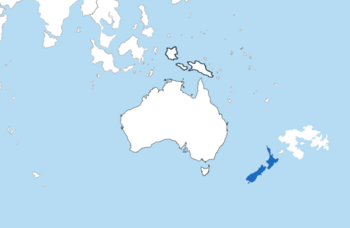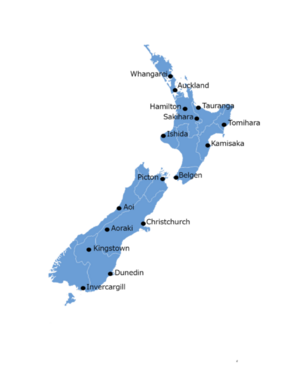New Akiba: Difference between revisions
No edit summary |
No edit summary |
||
| Line 115: | Line 115: | ||
'''New Akiba''' (''Nihhonese: 新秋葉 (Shin Akiha))'' is an island country in the southwestern Pacificanna Ocean. The country geographically comprises two main landmasses—the North Island (北島 ''Kitajima''), and the South Island (南島 ''Nantō'')—and around 600 smaller islands. New Akiba is situated some 1,500 kilometres east of Zanarkand across the Besaid Sea and roughly 500 kilometres south of [[Ingelmia]] and 250 kilometres south of [[Bellhals]]. Because of its remoteness, it was one of the last lands to be settled by humans. During its long period of isolation, New Akiba developed a distinct biodiversity of animal, fungal and plant life. The country's varied topography and its sharp mountain peaks, such as the [[Southern Alps (NA)|Southern Alps]], owe much to the tectonic uplift of land and volcanic eruptions. New Akiba's capital city is [[Belgen]], while its most populous city is [[Auckland (NA)|Auckland]]. | '''New Akiba''' (''Nihhonese: 新秋葉 (Shin Akiha))'' is an island country in the southwestern Pacificanna Ocean. The country geographically comprises two main landmasses—the North Island (北島 ''Kitajima''), and the South Island (南島 ''Nantō'')—and around 600 smaller islands. New Akiba is situated some 1,500 kilometres east of Zanarkand across the Besaid Sea and roughly 500 kilometres south of [[Ingelmia]] and 250 kilometres south of [[Bellhals]]. Because of its remoteness, it was one of the last lands to be settled by humans. During its long period of isolation, New Akiba developed a distinct biodiversity of animal, fungal and plant life. The country's varied topography and its sharp mountain peaks, such as the [[Southern Alps (NA)|Southern Alps]], owe much to the tectonic uplift of land and volcanic eruptions. New Akiba's capital city is [[Belgen]], while its most populous city is [[Auckland (NA)|Auckland]]. | ||
Sometime between 1525 to 1600, Nihhonese exiles from the [[Empire of Nihhon-koku]] were sent south by the Emperor as punishment for various crimes. These exiles settled in the islands that later were named New Akiba and developed a distinctive Nihhonese culture. In 1642, Erebonian explorer Grel Besad became the first Europan to sight New Akiba. In 1840, representatives of the United Kingdom and Nihhonese Lords signed the [[Treaty of Ishida]], which declared Lucis sovereignty over the islands. In 1841 New Akiba became a colony within the [[Lucis Empire]] and in 1907 it became a Dominion; it gained full independence in 1947, but the Lucian monarch remained the head of state. Today, the majority of New Akiba's population of 4.7 million is of a mix of Europan and indigenous Nihhonnese descent, followed by Asians and Pacificanna Islanders. Reflecting this, New Akiba's culture is mainly derived from Nihon and early Lucian settlers, with recent broadening arising from increased immigration. The official languages are English, Nihhonese and NA Sign Language, with English being very dominant. | Sometime between 1525 to 1600, Nihhonese exiles from the [[Empire of Nihhon-koku]] were sent south by the Emperor as punishment for various crimes. These exiles settled in the islands that later were named New Akiba and developed a distinctive Nihhonese culture. In 1642, Erebonian explorer Grel Besad became the first Europan to sight New Akiba. In 1840, representatives of the United Kingdom and Nihhonese Lords signed the [[Treaty of Ishida]], which declared Lucis sovereignty over the islands. In 1841 New Akiba became a colony within the [[Lucis Empire]] and in 1907 it became a Dominion; it gained full independence in 1947, but the Lucian monarch remained the head of state. Today, the majority of New Akiba's population of 4.7 million is of a mix of Europan and indigenous Nihhonnese descent, followed by Asians and Pacificanna Islanders. Reflecting this, New Akiba's culture is mainly derived from Nihon and early Lucian settlers, with recent broadening arising from increased immigration. The official languages are English, Nihhonese, Maoru and NA Sign Language, with English being very dominant. | ||
New Akiba is a developed country and ranks highly in international comparisons of national performance, such as health, education, economic freedom and quality of life. Since the 1980s, New Akiba has transformed from an agrarian, regulated economy to a diverse market economy. Nationally, legislative authority is vested in an elected, unicameral Parliament, while executive political power is exercised by the Cabinet, led by the Prime Minister, who is currently [[Tsujimura Seiji]]. King [[Noctis Lucis Caelum]] is the country's head of state and is represented by a governor-general, currently Sir [[Kageyama Yuzuru]]. In addition, New Akiba is organised into 11 regional councils and 67 territorial authorities for local government purposes. The Realm of New Akiba also includes Tokelau (a dependent territory); the Cook Islands and Niue (self-governing states in free association with New Akiba). New Akiba is a member of the [[Commonwealth of Nations]], [[ZANUK]], [[Organisation for Economic Co-operation and Development]], and [[Pacificanna Islands Forum]]. | New Akiba is a developed country and ranks highly in international comparisons of national performance, such as health, education, economic freedom and quality of life. Since the 1980s, New Akiba has transformed from an agrarian, regulated economy to a diverse market economy. Nationally, legislative authority is vested in an elected, unicameral Parliament, while executive political power is exercised by the Cabinet, led by the Prime Minister, who is currently [[Tsujimura Seiji]]. King [[Noctis Lucis Caelum]] is the country's head of state and is represented by a governor-general, currently Sir [[Kageyama Yuzuru]]. In addition, New Akiba is organised into 11 regional councils and 67 territorial authorities for local government purposes. The Realm of New Akiba also includes Tokelau (a dependent territory); the Cook Islands and Niue (self-governing states in free association with New Akiba). New Akiba is a member of the [[Commonwealth of Nations]], [[ZANUK]], [[Organisation for Economic Co-operation and Development]], and [[Pacificanna Islands Forum]]. | ||
Revision as of 03:31, 5 May 2019
Realm of New Akiba 新秋葉 (Shin Akiha) | |
|---|---|
| Anthem: God Defend New Akiba | |
 | |
| Capital | Belgen |
| Largest city | Auckland |
| Official languages | English Nihhonese Maoru |
| Demonym(s) | New Akibander Kiwi (Informal) |
| Government | Unitary parliamentary constitutional monarchy |
• Monarch | Noctis Lucis Caelum |
• Prime Minister | Tsujimura Seiji |
• Governor-General | Kageyama Yuzuru |
| Legislature | Parliament |
| Independence from the United Kingdom | |
• Dominion | 26 September X827 |
• Statute of Herrenhausen | 9 October X868 |
• De jure independence | 3 March X912 |
| Area | |
• | [convert: invalid number] |
• Water (%) | 1.6 |
| Population | |
• X941 (2015) estimate | 4,883,500 |
• Census | 4,883,500 |
| GDP (PPP) | estimate |
• Total | 164.338 billion Gil |
• Per capita | 36,151.87 |
| Gini | .32 low |
| HDI (2013) | very high |
| Currency | New Akiba Gil (NAG) (G) |
| Date format | dd/mm/yyyy |
| Driving side | left |
| Calling code | +64 |
| ISO 3166 code | NA |
| Internet TLD | .na |
New Akiba (Nihhonese: 新秋葉 (Shin Akiha)) is an island country in the southwestern Pacificanna Ocean. The country geographically comprises two main landmasses—the North Island (北島 Kitajima), and the South Island (南島 Nantō)—and around 600 smaller islands. New Akiba is situated some 1,500 kilometres east of Zanarkand across the Besaid Sea and roughly 500 kilometres south of Ingelmia and 250 kilometres south of Bellhals. Because of its remoteness, it was one of the last lands to be settled by humans. During its long period of isolation, New Akiba developed a distinct biodiversity of animal, fungal and plant life. The country's varied topography and its sharp mountain peaks, such as the Southern Alps, owe much to the tectonic uplift of land and volcanic eruptions. New Akiba's capital city is Belgen, while its most populous city is Auckland.
Sometime between 1525 to 1600, Nihhonese exiles from the Empire of Nihhon-koku were sent south by the Emperor as punishment for various crimes. These exiles settled in the islands that later were named New Akiba and developed a distinctive Nihhonese culture. In 1642, Erebonian explorer Grel Besad became the first Europan to sight New Akiba. In 1840, representatives of the United Kingdom and Nihhonese Lords signed the Treaty of Ishida, which declared Lucis sovereignty over the islands. In 1841 New Akiba became a colony within the Lucis Empire and in 1907 it became a Dominion; it gained full independence in 1947, but the Lucian monarch remained the head of state. Today, the majority of New Akiba's population of 4.7 million is of a mix of Europan and indigenous Nihhonnese descent, followed by Asians and Pacificanna Islanders. Reflecting this, New Akiba's culture is mainly derived from Nihon and early Lucian settlers, with recent broadening arising from increased immigration. The official languages are English, Nihhonese, Maoru and NA Sign Language, with English being very dominant.
New Akiba is a developed country and ranks highly in international comparisons of national performance, such as health, education, economic freedom and quality of life. Since the 1980s, New Akiba has transformed from an agrarian, regulated economy to a diverse market economy. Nationally, legislative authority is vested in an elected, unicameral Parliament, while executive political power is exercised by the Cabinet, led by the Prime Minister, who is currently Tsujimura Seiji. King Noctis Lucis Caelum is the country's head of state and is represented by a governor-general, currently Sir Kageyama Yuzuru. In addition, New Akiba is organised into 11 regional councils and 67 territorial authorities for local government purposes. The Realm of New Akiba also includes Tokelau (a dependent territory); the Cook Islands and Niue (self-governing states in free association with New Akiba). New Akiba is a member of the Commonwealth of Nations, ZANUK, Organisation for Economic Co-operation and Development, and Pacificanna Islands Forum.
Since 1985, The Zanarkian and New Akibander government are in dispute with Ingelmia on the matter of Ingelmia's threatening expansion into the island itself.
Etymology
History
Georgraphy
Dependencies
Policies
Government
State and territories
Devolved administrations
Law and criminal justice
Foreign relations
Military
Economy
Demographics
Template:Largest Cities in New Akiba


